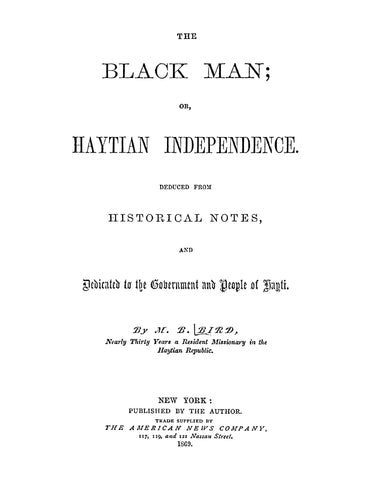
HAITI: The Black Man: Or, Haytian Independence, Deduced from Historical Notes and Dedicated to the Government and People of Hayti
by M B Bird. 1869. 461p
The document delves into the historical narrative of Haiti, starting with Boyer's abdication and Riviere's entrance into the capital with a substantial military force of ten thousand troops. This event marked the beginning of a new government known as "L'Assemblee Constituante," signaling a shift in the political landscape of the country. The Provisional Government's emphasis on the education of the masses became a focal point during this period, reflecting a commitment to empowering the population through knowledge and learning. Successive presidencies by Gurrier, Pierrot, and Riche followed, each making their mark on the evolving socio-political fabric of Haiti.
Furthermore, the establishment of a Wesleyan School in Port au Prince underscored the importance of education as a tool for societal advancement and development. The document also sheds light on Christophe's ambitious pursuits, which ultimately led to divisions in Haytian history, showcasing the complexities and challenges faced by the nation during that era. Additionally, the French expeditions to St. Domingo between 1802-1803 and Petion's presidency characterized by genuine republicanism and widespread popular support are highlighted as significant historical milestones that shaped Haiti's trajectory.
Overall, the historical accounts presented in the document provide insights into the political, social, and educational dynamics of Haiti during the periods discussed. From governmental transitions to educational initiatives and the impact of ambitious leadership, the narrative captures the multifaceted nature of Haiti's history and the various forces at play that influenced its development and progress.
